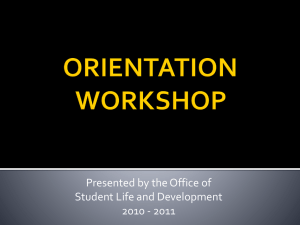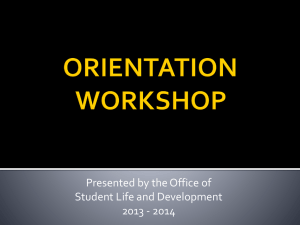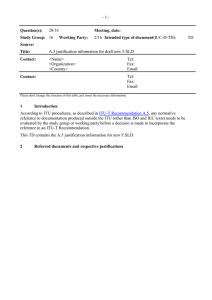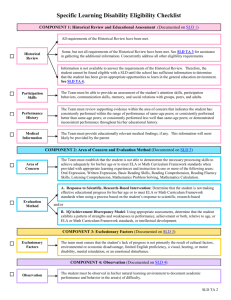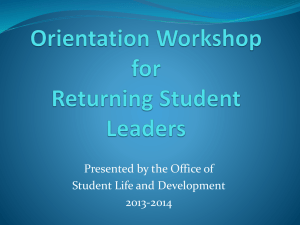STUDENT LIFE DIVISION STRATEGIC PLAN 2008-2013 Revised 1/28/09
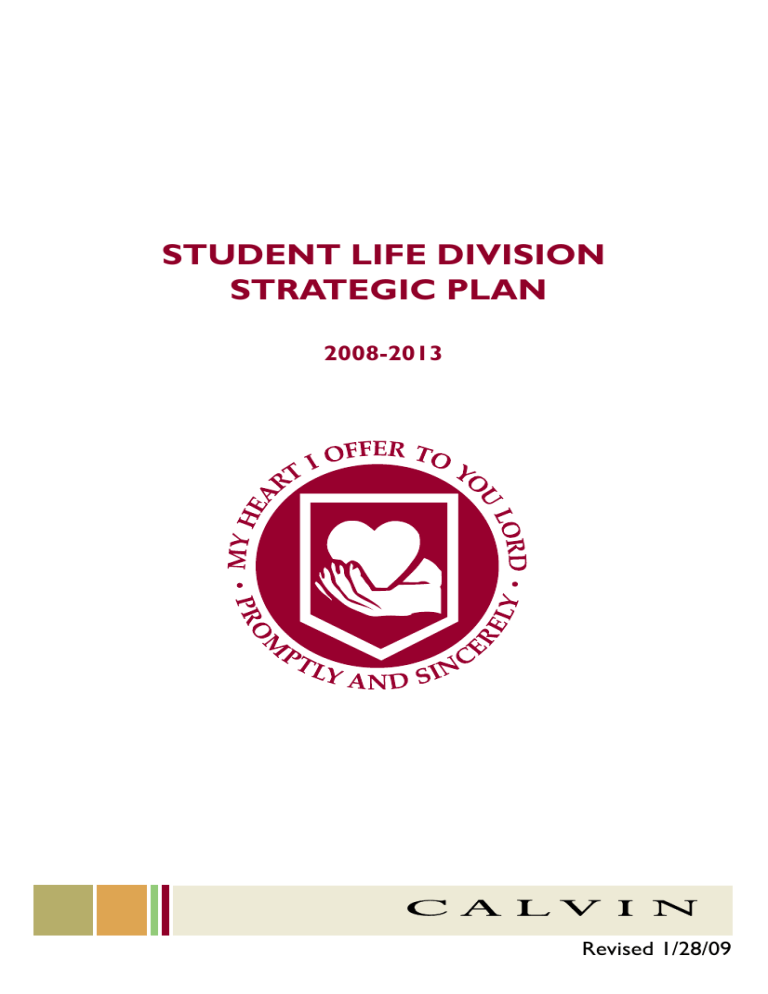
STUDENT LIFE DIVISION
STRATEGIC PLAN
2008-2013
Revised 1/28/09
INTRODUCTION
In 2006 the student life division (SLD) began working on a strategic plan.
As it had been twelve years since the SLD mission statement was written and adopted, the SLD senior leadership team agreed that it was time for a strategic plan. In addition, the accreditation body for the college
(North Central Association) also recommended that each division of the college have a five year plan. The recently-adopted college strategic plan is the foundation for the SLD plan’s strategic objectives.
The SLD strategic planning committee spent twenty months reviewing existing documents and data (the National Survey of Student Engagement, the CIRP data and the American College Health Association/
National College Health Assessment), and sought out new information from interviews and surveys of Calvin’s faculty, students and SLD staff.
Divisional meetings were held throughout the process so that non-committee members understood and had opportunity to speak into the plan.
Out of that work came the decision that while there could be a shorter
SLD mission statement, the existing one had broad divisional acceptance and buy in. The committee identified the values of the SLD and ways the division could implement the college strategic goals that pertain most directly to student life.
The SLD plan first embraces the college vision statement and new five year plan (which is based on the College’s expanded statement of mission.) It further embraces Calvin’s Student Learning Outcomes of 2006 and the Core Curriculum virtues . Lastly the strategic plan incorporates the SLD mission statement of 1994 and is interwoven with the key threads of our six Core Curriculum values.
STUDENT LIFE DIVISION: STRATEGIC PLAN
2008-2013
STUDENT LIFE MISSION STATEMENT (adopted 1994)
As servants of God and partners in education, we challenge and support students as they seek meaning in their college experiences. With delight and anticipation we present them to the world as people who are learning to love the things that God loves, so that the world is blessed by their leadership.
STUDENT LIFE DIVISION VALUES (adopted 2008)
Values are the beliefs and principles held by an organization. They manifest themselves in actions and behavior; they guide decision making, relationships with others and day-to-day operations. They are shared by all members of an organization and provide the foundation on which decisions are made.
1. Christian Identity: This value affirms that our thoughts, words, actions and interactions are governed by a desire to manifest Christ-in-us. We embrace a Reformed world- and life-view and the call to be agents of renewal in the academy, church and society.
2. Partners in Education: This value emphasizes our vital role in the education of the whole person. The SLD partners with other members of the college, community and church in the formal and informal education and development of students.
3. Collaboration: This value emphasizes teamwork and unity in purpose. It encourages awareness of how others (both in- and outside the SLD) might be affected by what we are doing or planning. Collaboration is a stewardly way to work. It discourages working in isolation or in departmental silos.
4. Inclusive Community: This value emphasizes our commitment to celebrate diversity, to pursue practices which combat injustice, and to practice hospitality. With this value we also emphasize the strength and power of belonging to a diverse and inclusive community.
5. Professional Excellence: This value emphasizes our commitment to providing the highest caliber of professional service available. It points us to staying current in both knowledge-base and professional practice within our spheres of work. We commit ourselves to being vigilant about ways to offer better service to our students and others. We want to encourage students to excellence in their academic endeavors.
6. Innovation and Creativity: This value affirms our openness to new ideas even as we appreciate lessons and learning from the past. As a division, we demonstrate a willingness to depart from convention when there is something good to be accomplished. A commitment to innovation makes us less willing to give up on a goal or objective and more likely to explore alternatives.
7. Wellness: This value directs us to the goal of shalom, to right relationships with God, family, work and others. With this value we are called to model spiritual, physical, and mental health for one another and students. It will require us to examine how we prioritize our time and resources to make difficult choices that have potentially healthy results.
1
The SLD believes it can partner in learning on at least seven of the college’s strategic objectives. At the request of the provost, the SLD deans and directors have identified specific ways the various departments of the division could implement the college objectives. These are shown in italics.
STRATEGIC OBJECTIVES AND INITIATIVES
OBJECTIVE 1:
We will teach and learn in a community of faith, mutual care and courage. We will strive to work relationally, with humility and transparency, balancing effective use of time with the need to be present to each other in face-to-face conversation.
(Objective 2A of the college strategic plan).
4 How will this promote learning?
As a strategy for learning, over the next five years we will build a campus culture marked by:
FAITH
• Promote faculty/staff partnerships dedicated to faith formation of students.
• Provide a campus-wide book study for students, faculty, and staff to participate in together at least every other year.
• Explore how the College Chaplain and faculty can enhance the integration of faith and learning both inside and outside the classroom.
• Explore options for discussing Reformed identity and an integrated faith perspective for the SLD through SL professional development and staff orientation.
• Invite faculty speakers for Cultural Discerner meetings.
• Partner with faculty on music listening events.
1
• Strengthen and unite leadership across divisions related to faith formation.
• Sponsor a retreat for deans, student life leadership, and department chairs or designees on faith formation.
• Continue lively inter-departmental conversation about the broader meaning of
Christian formation as something that includes racial reconciliation, sustainability, cultural discernment, etc. Through such conversation, develop a formation curriculum for students within the SLD’s areas of responsibility.
• Sponsor activities, research and writing as part of the Piety and Engagement
Project.
• Reinvigorate our understanding of our work as worship.
• Promote a chapel program that serves as a faith curriculum for the campus community.
• Working with the Chapel Committee capture the college’s intention for faculty, staff and students on the purpose of chapel at Calvin and when and how to participate.
• Include academic departments in chapel planning.
• Increase faculty, staff and student attendance at chapel so that each member of the Calvin community attends once a week.
• Organize a yearly chapel service based on the unique interests and study of the
Cultural Discerners.
How will this promote learning? 5
CARE AND COURAGE
• Model active engagement through on-campus
1
speakers and guests.
• Continue holding conversations with artists who come to campus through the student activities office.
• Continue to sponsor and assess the Festival of Faith and
Music on a bi-yearly basis.
• Encourage student senate to pick a national or global issue as their focal point for educational emphasis each year.
• Encourage appropriate student organizations to institute a point/counterpoint model of hot topic debates/discussions twice a semester.
• Continue engagement of students through speakers brought to campus by academic departments and other sponsoring agencies.
• Teach students civil discourse in the classroom and in campus life.
• Consider opportunities for teaching or modeling civil discourse in every program we offer.
• Educate ourselves about the practice of civil discourse.
• Sponsor a civil discourse series in the residence halls and develop training to help RAs promote civil discourse in their living communities.
• Straightforwardly identify and address instances of un-civil discourse—as well as times when we see students agree too quickly so as not to offend or do the hard work of discussion.
• Establish a model for intellectually vigorous, respectful discussion in Prelude.
• Address and model civil discourse with student leaders.
• Support practices that build stronger relationships between coworkers and between students.
• Encourage bi-semesterly SLD departmental fellowship gatherings in which two offices partner and take turns hosting each other over coffee.
• Have open mic sessions each semester with the SLT and students.
• Initiate and sustain collaboration between focus leaders and residence hall lead ership for residence hall programming.
6 How will this promote learning?
• Support programs that engage the entire campus in contemporary issues.
• The VP for student life and Provost as Chair of the
Homosexuality and Community Life Committee will hold listening sessions on the Statement on Homosexuality and
Community Life.
• Address sexual faithfulness with RDs and RAs in their training.
• Request that PPC establish a task force to analyze the programming of events on campus and the feasibility of coordinating programs and speakers.
• Identify college-wide themes or issues under which designated programs can be sponsored.
• Provide two programming initiatives annually via the Sexual Assault Prevention
Team (SAPT) and other collaborating departments to educate students about sexual assault prevention.
• Re-evaluate the SAO’s mandate to avoid over-programming on weekends.
• Incorporate anti-racism into all programming.
• Continue to promote concerts that engage students and community members.
1
• Periodically evaluate our capacity to disagree with care and courage.
RECONCILIATION AND PARTNERSHIP
• Increasingly reflect the FEN goals for the curriculum.
• Actively work with students to develop a relationship of trust, and recruit students of color to work for campus safety with the goal that 10% of student employees each year will be students of color.
• Over the course of five years, ensure that all student life staff members attend a two-and-a-half-day anti-racism training or equivalent.
• Sponsor discussions of books or articles each year on topics related to racial reconciliation in collaboration with the Dean for Muliticultural Affairs and other partners.
• Design new staff orientation to include an effective FEN overview.
• For existing staff, provide cultural awareness and diversity training for all campus safety staff.
• Continue to hold RD training sessions/discussions on FEN and working with students of color.
• Continue to hold RA and other student leader training sessions on
FEN/anti-racism/inclusive community.
• Promote and attend offerings sponsored by the office of multicultural affairs.
How will this promote learning? 7
1
• Continue to support and develop the Grassroots living-learning community.
• Hold SLT meetings with AHANA students once a year.
• Continue to make UnLearn week a programmatic focus.
• Continue to address instances of racial, gender, and sexualidentity harassment when they are reported.
• Develop an educational sanction for harassment cases by fall
2010.
• Encourage students of color into higher education through student leadership opportunities, grad schools, and internships here at Calvin.
• Continue to offer and promote cross-cultural engagement courses which partner N. American and international students for discussion and interaction.
• Involve voices of color in our concert season and the Festival of Faith ad Music.
• Challenge both women and men to aspire to lives of leadership.
• Continue leadership mentoring opportunities between students and senior administrators.
• Use professional development opportunities to sharpen administrative leader ship skills.
• Support leadership involvement of SLD staff and support student life leadership programs for students.
• Study and sponsor programs that encourage all students, particularly male students, to lead and engage in college opportunities.
• Continue to develop and implement leadership development programs and experiences that meet the performance expectations of employers and the com munity through the career development office.
• Continue to offer yearly vocational workshops where international students are challenged by alumni and faculty/staff to become more involved outside the classroom in internships, clubs, campus leadership positions or the like.
• Encourage juniors and seniors who went through the CD curriculum as sopho mores to return in teaching, editing and other roles.
• Continue to offer late summer leadership training for RAs, WAs and Campus
Safety Officers.
8 How will this promote learning?
• Model, where possible, gender-fair and family-friendly policies for all employees.
• Make this a topic of departmental meetings at least once a semester.
• Continue our leadership in educating students with disabilities.
• Where possible, create student life facilities and physical spaces that respect and include students with disabilities.
• Assess how student life division programs and personnel support students with disabilities.
• Hold SLT meetings with students with disabilities once a year.
• Continue to hold RD training sessions/discussions on students with disabilities.
1
GLOBAL CONNECTION AND LOCAL RESPONSIBILITY
• Continue to embed the cross-cultural engagement goals of the core curriculum in core and major course offerings and in co-curricular offerings.
• Increase the cross-cultural competence of the campus through programs of faculty and staff development.
• Hold SLT meetings with international students once a year.
• Offer professional development through the office of international student development to increase the cross-cultural competence of SLD members.
• Attend in-service opportunities related to cross-cultural competence.
• Provide a greater proportion of students with an international learning experience.
• Collaborate with the academic division (via the career development office, servicelearning center and other SLD departments) to increase international internship opportunities and student participation.
How will this promote learning? 9
1
• Encourage campus-wide initiatives that address global and
local issues.
• Encourage Creative Dining in its global efforts.
• Encourage students to love and engage in the local community.
Hold a “Revision” program in all living communities - an opportunity for students to learn about the city and participate in the broader community. Add a “Revision” program experience to RA training, and encourage increased use of public transportation for floor events.
• Book international films and artists.
• Incorporate foods that are locally grown and/or from local busi nesses whenever possible for events.
• Seek to purchase items that are fair trade, sweatshop-free and environmentally sound when needed.
INTERDISCIPLINARY SYNERGY
• Develop and support a variety of undergraduate learning communities.
• Collaboratively author a white paper on learning communities through residence life, Project Neighborhood, student development, and the office of Christian forma tion following the launch of three new learning communities in the fall of 2008
(Grassroots, Honors, and Creation Care).
• Consider and develop other cluster ideas (proximate-to-campus housing).
• Develop programs to support team teaching.
• Explore possibilities for ISD and MSD to share curriculums and collaboration with team teaching.
• Work towards collaborative programming.
• Foster relationships between students and alumni.
• Grow the MBA@Calvin program, the annual careers/employers dinner and other career development/alumni association program initiatives.
CREATION CARE
• Develop sustainability as an educational goal.
10 How will this promote learning?
• Provide support for sustainability practices, compatible with resources.
• Plan for a Campus Commons with LEED certification.
• Have departments identify specific strategies for sustainability and stewardship in their particular office areas (e.g., use of paper/plastic products, etc.)
• Seek financial support to replace existing campus safety vehicles with hybrid vehicles.
• Continue to promote the use of alternative forms of transportation, including the RAPID and bicycles.
• Increase the number of bicycle racks around campus by at least 5% each year.
• Develop a bicycle registration program to better regulate bicycles and improve the ability to return lost/stolen bicycles to their owners.
• Work with the Environmental Task Force, the engineering department and the biology department to study the feasibility of reducing Calvin’s carbon footprint.
• Make sustainability a programming focus for the college:
• Continue to support and develop the creation care living-learning community.
• Publish a sustainability guide for students.
1
• Have energy-reduction competitions and awareness-raising in living communities.
Review the feasibility of CF bulbs, one refrigerator per room, motion sensor lights in laundry rooms, and reusable plates for residents to take to hall cookouts or floor/hall events.
• Improve recycling by providing recycling containers in each room and having curbside pickup.
• Research a program for donating leftover food from green room catering at concerts.
• Use reusable, recycled and recyclable dishes and flatware at events.
• Enhance employee and student wellness.
• Promote health as an ecological commitment to a healthy campus community in which all students, faculty, and staff are supported to reach their potential.
• Propose a PPC task force with broad campus representation to cast a vision for a healthy campus.
• Review the feasibility of a smoke-free campus.
• Develop dedicated staffing and financial resources to implement healthy campus initiatives
• Conduct a yearly sustainability audit.
How will this promote learning? 11
1
DEVELOPMENTAL MENTORING
• Provide ongoing professional development for staff in their interactions with students, i.e. Broene counselors will receive a minimum of 15 hours of continuing education annually on topics germane to college counseling.
• Support a strong honors program that encourages students to take on additional academic challenges and prepare for academic leadership.
• Continue to support and develop the honors living-learning community.
• Support programs to enhance faculty-student engagement.
• Include a section on the mentoring program at the fall faculty conference.
• Develop ways to bring professors into living communities and/or dining halls more frequently.
• Investigate and implement more residence-hall specific Prelude groups assigned to Calvin faculty members as instructors, with the opportunity for those faculty to maintain a connection to that residence hall beyond Prelude.
• Maximize first-time meetings between students and Broene counselors by implementing an online client preregistration system, allowing students to provide significant information to a counselor prior to their first meeting.
• Continue to provide disciplinary interventions and mentoring with at-risk students through judicial affairs.
• Establish assessment tools to measure the effectiveness of SLD programs that include a mentoring component.
12 How will this promote learning?
STRATEGIC OBJECTIVES AND INITIATIVES
2
OBJECTIVE 2:
We will learn with our head, heart and hands. We will focus on engaged and enacted (practiced) learning throughout the undergraduate experience, partnering with local city groups, agencies, and businesses for learning and service.
(Objectives 2.B. and 5.B. of the College Strategic plan).
How will this promote learning? 13
2
Promote students’ early and eager engagement in
the college experience.
• Review and revise our first-year program until it meets the varied needs of these students.
• Promote early engagement between faculty and first-year students.
• Invite a faculty member to reside in the vanReken apartment for a term.
• Encourage residence halls to have faculty speak on issues
arising from the 2007 report of the American College
Health Association/National College Health Assessment.
• Utilize faculty for We-Haul.
• Investigate a fall faculty/student talent show.
• Institute a fall academic fair.
• Continue to increase student participation in internships.
• Collaborate with faculty, employers, and students to grow the career development office’s internship program by five percent each year.
• Hold consultation with the ADISD, an immigration counselor and the Career Ser vices Department to explore internships and employment for international students which meet their immigration requirements.
• Encourage through staff support and programming the ability of upper class students to live faithfully as Christians in city neighborhoods.
14 How will this promote learning?
STRATEGIC OBJECTIVES AND INITIATIVES
OBJECTIVE 3:
We are committed to diversifying our staff as a reflection of the Kingdom of God among us. We will enhance mechanisms to recruit and retain a diverse staff and faculty who are committed to the Reformed Christian identity and mission of the college.
(Objective 3.F.1. of the College Strategic Plan).
3
• Enhance recruiting networks to recruit professional SL staff of color.
• Work toward each department in the division being diversified by race and gender.
• Partner with faculty, staff and students of color for programming to strengthen connections between voices of color and Reformed identity.
How will this promote learning? 15
4
OBJECTIVE 4:
STRATEGIC OBJECTIVES AND INITIATIVES
Calvin’s mission is our mission. We will sustain the college’s mission by commitment to shared governance and by improving internal communication.
(Objective 3.A. of the College Strategic Plan).
• We will continue a commitment to shared governance, with support for faculty investment in college governance.
• Attend college-wide meetings that review governance documents.
• We will continue alignment of the strategic plan and governance.
• Student life division faculty committees (Chapel committee, student life
committee, disciplinary committee and appellate board) will review the college’s
strategic plan.
• We will strengthen our methods of internal communication.
• Use Student Life Updates and BOT reports to communicate the breadth of
work in the SLD.
• Create a KnightVision site for the SLD to communicate committee work.
16 How will this promote learning?
STRATEGIC OBJECTIVES AND INITIATIVES
OBJECTIVE 5:
We are committed to providing highquality accommodation for students.
We will address space and facility needs by funding building renovations, acquisitions and new construction, guided by the Campus Master Plan and the Sustainability Statement.
(Objective 3.E. of the College Strategic Plan).
5
• Complete residence hall lobby and basement renovations.
• Complete KE apartment renovations.
• Integrate two new Project Neighborhood houses.
• Plan for continued growth in KE and Glen Oaks - address shuttle issues and new apartment possibilities.
• Increase on-campus housing for students.
• Investigate the feasibility of a three-year on-campus residency requirement.
How will this promote learning? 17
6
OBJECTIVE 6:
STRATEGIC OBJECTIVES AND INITIATIVES
We will make data-driven decisions arising from focused assessment.
(Objective 2.C.2. of the College Strategic Plan).
• Develop one data-gathering mechanism for any new program as well as for any program that does not currently have such a mechanism.
• Provide resources for collecting accurate data to guide our decisions.
• Develop a basic assessment plan for each unit, with outside expertise and assistance if necessary.
• SLT will submit annual State of the Department reports by June 1 each year that reflect on the just-completed work and predict needs going forward.
• The VP for student life will appoint an assessment coordinator or point person to monitor and oversee assessment initiatives for the SLD.
18 How will this promote learning?
• The Broene counseling center will implement the Behavioral Health
Measurement to assess the emotional health of students in counseling initially and over time, identifying areas of improvement and ongoing concern.
• The career development office will collaborate with the academic division and the academic deans to improve data collection of graduate school enrollment and employment status of graduating students. The ADISD will use this data and other measures to determine what international students do once they leave Calvin.
• Health services will participate in the ACHA/NCHA national health survey every four years.
6
• Establish methods of record-keeping for Cultural Discerner programming.
• Continue to invite student evaluation through the Student Senate Survey and other means.
• Continue to evaluate the Cultural Discerner curriculum through annual student feedback.
How will this promote learning? 19
7
OBJECTIVE 7:
STRATEGIC OBJECTIVES AND INITIATIVES
We seek to foster co-curricular work that serves the Reformed church and the broader church throughout the world.
(Objective 5.A. of the College Strategic Plan).
• SLD professionals will submit articles to The BANNER or offer to speak on issues that cross over between the church and the college.
12/16/2008
20 How will this promote learning?
2006 CALVIN COLLEGE STUDENT LEARNING OUTCOMES
Develop and articulate knowledge of:
• God’s revelation in Scripture and creation, and its interpretation in the Reformed Christian tradition,
• The diverse cultural, natural, and social forces that shape our world,
• Themselves—their nature, gifts, and identity, and
• A chosen area of in-depth study.
Demonstrate skills in:
• Critical thinking,
• Sound reasoning,
• Effective communication,
• Problem-solving, and
• The particular methods of their area of in-depth study.
Demonstrate—given a Christian commitment—
• A devotion to the life of discipleship
• A dedication to Christian virtues, and
• An active pursuit of their vocation in renewing God’s world.
2000 CALVIN COLLEGE CORE CURRICULUM:
CORE VIRTUES
Diligence, Patience, Honesty, Courage, Charity, Creativity, Empathy,
Humility, Stewardship, Compassion, Justice, Faith, Hope, Wisdom
COMMITTEE MEMBERS
Gay Kaashoek (chair), Shirley Hoogstra, Lori Gesink, Rick Zomer,
Jacqueline Rhodes, William Corner, Randy Wolthuis, Paul Ryan, Jay Wise and Dana Hebreard.
How will this promote learning? 21
